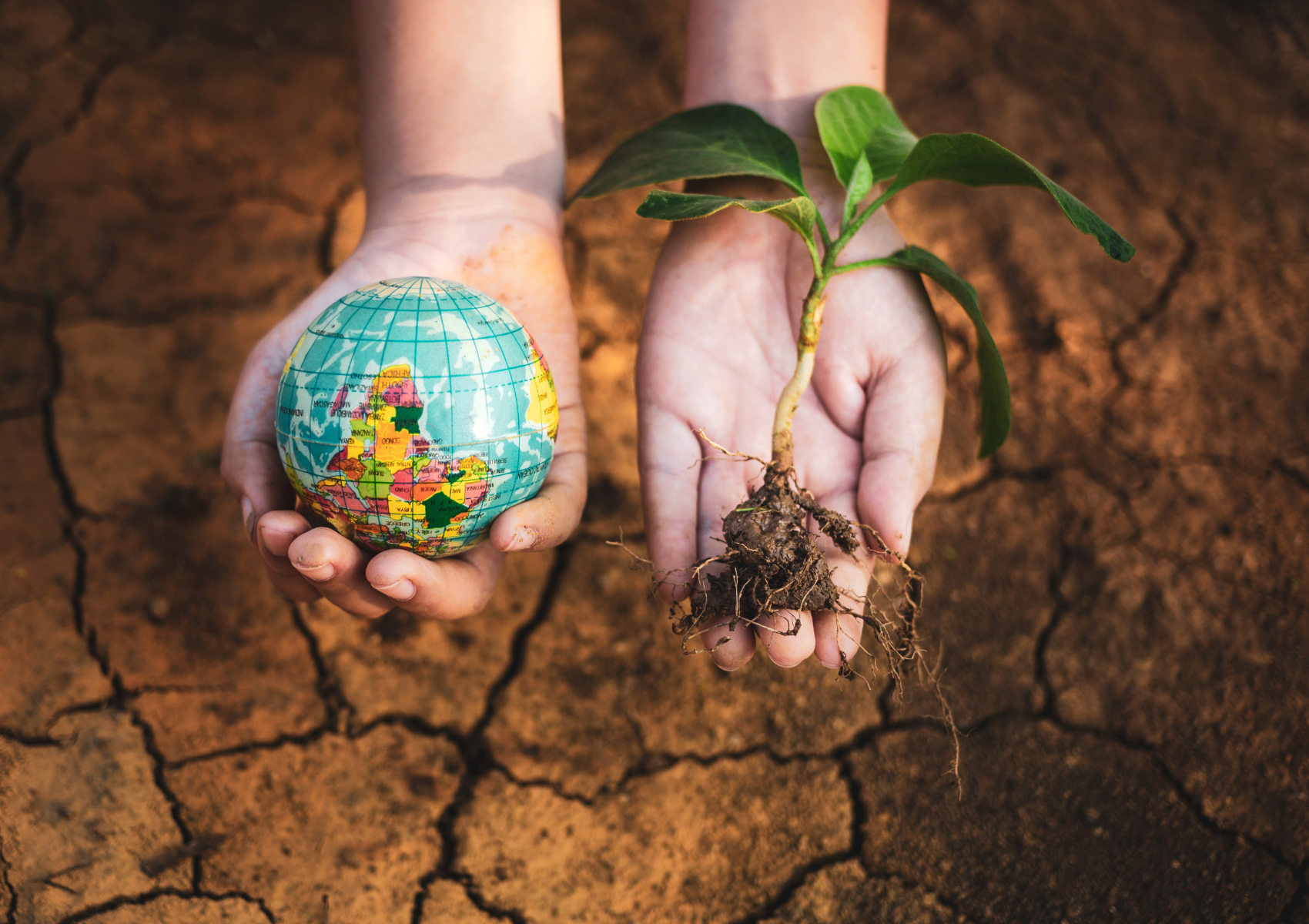
Beyond Doom and Gloom: The Role of Emotion and Resilience
About the Author
ROBIN DOYLE is a graduate of Florida State University where she earned her B.A. in English with a concentration in Editing, Writing & Media. She is interested in the intersection of environmentalism and social justice, exploring the ways in which media representations of social issues impact societal values. She aims to use this knowledge to promote meaningful change, sustainable behaviors and environmental equity.


Overview
In this module you will learn about the emotional side of being a changemaker. This module also addresses the concept of climate optimism, emphasizing the power of hope and positive action in addressing climate challenges. Ultimately, the module aims to equip you with the tools and mindset necessary to navigate the emotional challenges of the work so that you can contribute to a sustainable future.
Key Learnings
Upon completion of this module, you will have:
Learned the importance of radical self-care.
Identified emotional challenges of activist work.
Cultivated self-awareness and nurtured emotional resilience.
Cultivated sustainability in self-care and world-care.
Required Content (1.5 hour estimated commitment)
To complete this module, you must:
Read the entire module.
Watch the following videos.
Read the following articles.
Supplemental Content
The following articles / videos / resources are recommended but not required:
AASHE Beyond Doom and Gloom
Healing as a Radical Act
How to be more self-aware
Healing Justice Panel
CDC: Social Isolation and Mental Health Impacts
Working Through Environmental Despair – Joanna Macy
Further Reading on Emotional Resilience. Joanna has many publications on this topic, so this item is just one taste and we encourage you to read more from her.
Emotional Resilience Toolkit for Climate Work- Climate Therapy Alliance
University of Michigan Well-being Collective Resources


Introduction
Activism takes care and courage. We also know that it can lead to a whole range of emotions from joy to frustration, especially when it comes to environmentalism and climate justice. You may feel the weight of the planet on your shoulders as you strive for action and solutions to complex environmental issues, yet this passion and drive can lead to working yourself to the point of exhaustion and burnout.
This module will help you understand and apply coping techniques, useful perspectives and other ways to use emotional regulation, resilience, and radical self-care as you undertake the journey of being a changemaker. A sustainable future for people and the planet means that you, and all changemakers, must learn and practice compassion and self-care by creating a sustainable support system for yourself as you work towards your goals. You will also see how you can share these valuable insights and tools with others.
Climate Optimism
Climate optimism is all about staying hopeful and taking positive action in the face of climate challenges. It recognizes the seriousness of climate change but believes that we can make a difference by working together. Climate optimists know that solutions exist and that we can protect the planet through individual and collaborative local and global efforts. In fact, much of this training was developed by a group of dedicated climate optimists already utilizing and benefitting from these ideas.
Climate doomism is often the rhetorical approach that is used to motivate people to take climate issues seriously. On the other hand, it can also impose a sense of dread and existential fatalism which leads some people to become apathetic and lose hope for a planet they believe is unsalvageable.
With climate optimism, you can see the opportunities to positively transform our world. It inspires people to envision a future where ecosystems thrive, clean energy is abundant, and communities live in harmony with nature. By choosing hope, climate optimism and an action-driven mindset, you will find that a better present is possible, and that inevitably makes the future a more promising prospect.
Watch the following video that looks at the history of climate doomism, and why there is a need for radical hope in the face of the climate crisis. The narrator unpacks exactly why radical hope is crucial for the climate change movement.
Review the following optional web page, created by multiple higher education networks, that moves beyond doom and gloom to action for the policies we need for a clean energy and more sustainable future. Now that you have considered the role of hope in overcoming climate doomism, it is important to think about how self-care factors into your work as a changemaker.

“Practicing radical self-care means we’re able to bring our entire selves into the movement. It means we incorporate it into our work, as activists, ways of acknowledging and hopefully moving beyond trauma. It means a holistic approach.”
— ANGELA DAVIS

Practicing Radical Self-Care
As a life-long changemaker at the forefront of the Civil Rights movement, Davis learned strategies to protect her peace in the midst of the chaos around her. She faced jail -time due to her work as an activist, and while she awaited trial, she learned methods of radical self-care. In order to be an effective changemaker, you need to comfort yourself, love yourself and care for your needs with as much passion as you have for the issues you care about. Learning to use positive self-affirmations and self-talk, and self-compassion, in addition to self care like yoga, exercise, healthy eating and creating a balanced schedule, are wonderful ways to increase your quality of life and the quality of your work.
Watch the following required video, where Davis discusses the role of self-care, and consider the following questions related to the suggestions you have learned so far in this module.
OPTIONAL JOURNAL QUESTIONS
What does it mean to you to practice self-care as a radical act? As you work towards a sustainable future for the world, in what ways can you work towards a sustainable sense of self?
Cultivating Self-Awareness
In the activist and changemaker journey, self-awareness is like a compass guiding us through our emotions and actions. In order to understand your identity as a changemaker, you need to understand your feelings as they relate to your needs and deepest desires. By exploring your inner self, you can gain insights into your motivations and limitations so that you can put the best version of yourselves forward. This self-awareness not only helps you take care of yourself, but also connects your healing journey to healing the planet. It empowers you to be a compassionate changemaker, leading with authenticity and empathy.
For more tips on cultivating self-awareness, you can look at the supplemental resource found here.
OPTIONAL JOURNAL QUESTIONS
Think back to when you began developing your changemaker story for this training. What role does your identity play as it relates to being a changemaker? On the flipside, what impact does being a changemaker have on your overall identity? How are the two connected?
Emotional Maturity
Emotional maturity is an essential piece of development for everyone, but especially a changemaker. You have to learn to weather storms, setbacks, and wins with dignity and professionalism. You can learn to deal with your emotions in a way that produces more positive outcomes. Think of emotional maturity as a way of keeping your passion where it belongs, focused on your issue, and not getting in the way of it. Remember that a whole range of feelings like frustration, sadness, and joy are all valid emotions that you’ll come across as a changemaker, but they don’t need to rule over you. Emotional maturity helps you develop the ability to express your feelings in a more useful way, which you will need as an environmental changemaker. This ability will also help you with all your relationships. Watch this short video and think about what you need to do to grow your emotional maturity.
Developing Emotional Resilience
Emotional resilience is the capacity to adapt, thrive, and maintain a sense of well-being despite facing adversity. It involves cultivating skills and attitudes that enable you to navigate challenges without being overwhelmed by them. Emotional resilience isn’t just an essential skill for a changemaker, but can be applied to many situations. Read this required article from the American Psychological Association on Building your resilience and think about one thing you could do right now to build resilience. This article is filled with multiple useful ideas on how to handle challenges in life and is worth revisiting multiple times to incorporate many of the ideas into your work and personal life. When combined with the content in previous modules on navigating conflict, managing anger, all of these ideas work together to produce more effectiveness, happiness, and positive outcomes.
When it comes to your work as a changemaker not everything will go the way you planned in the future, and that’s okay. As you grow your self-awareness and learn your own methods of self-care, you will be able to weather setbacks and become more flexible in how you reach your goals in life. As a changemaker and beyond, developing a sense of emotional resilience will help you meet and adapt to challenges without diminishing your sense of purpose or self.

Healing As a Radical Act
As we face the climate crisis and other pressing environmental issues across the globe, we have much to learn from Indigenous and marginalized communities and from a variety of spiritual traditions that address healing our connections and relationship with the earth. Many of these communities have maintained or reestablished a traditional and symbiotic relationship with the Earth. To champion environmental issues and climate justice, it is very helpful to learn and understand their knowledge and values, recognizing that healing ourselves and the planet are closely connected to each other.
At the heart of this insight lies the recognition that healing is not merely a personal or individual endeavor; it is a collective act intertwined with the restoration of our planet. Indigenous communities have long embraced practices that prioritize the health of both people and the environment, recognizing that a thriving Earth is essential for human well-being. These ideas exist across many cultures and it is impossible to include every story here. If you were interested in healing justice and want to learn about more dimensions related to healing justice, we encourage you to watch the following optional video that features a panel discussion on healing justice at the Indigenous Economics Conference.
The Power of Community
For as long as humans have existed, we have lived in communities. Whether it is a faith based group, a student group on your campus or a group with like-minded people outside of educational institutions, there is something powerful that exists within communities. When we come together, we can find ways to support one another. Nowhere is this more apparent than in times of crisis. Whether it is a wildfire or a hurricane, these natural disasters bring to life the power of community to rebuild and repair in the face of devastation.
The exciting thing is that we can utilize the power of building community and resilience at all times, not just during a crisis. Community structures, like local currencies, community listservs, local development banks/green banks and mutual aid societies and volunteer banks can all help build stronger communities.
Environmental challenges such as climate change are complex problems that can be overwhelming. Rather than taking on the world's problems by yourself, we encourage you to join (or build) a regional and/or global community that gives you the support you need. By combining community with your work as a changemaker, not only do you become more effective, but you open up the door to new relationships and friendships that can make life more meaningful.
Further solidifying the power of community, it has been well established that loneliness and isolation have negative impacts on physical and mental well being. Recognizing this, it is important to know, you are not alone. We have been there too. If you are concerned about your own mental health, we strongly encourage you to reach out for help. Here are some resources that may be helpful:
US Based Resources
For US based folks that are experiencing a mental health crisis, you can get help by dialing 988 or by visiting the site here.
Consider joining a support group through a group like the National Alliance on Mental Illness.
International Resources
For country specific resources, visit this site created by the well-known author Brené Brown.
As we work to build this section, please let us know in the evaluation form for this module if you think of any additional resources that we should include here.



